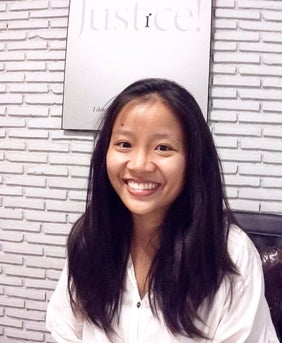Tanyalak's Blog
Thailand's sexist words should really be banned right now!

Dated: Wednesday, February 14, 2018
Author: Tanyalak Thongyoojaroen
Sexist phrases have been part of everyday conversation for such a long time here in Thailand. You hear people, young and old, women as well as men, use them often. It's rather sad seeing people normalize such language and neglect all the possible consequences of that. Language defines us as human beings and we should use it carefully. Let me give a few examples of common sayings that should be banned immediately:
อย่าทำตัวเหมือนผู้หญิง (ya tam tua muen puying) / "Don't act like a woman."
ทำตัวให้แมนๆหน่อย (tam tua hai man man noi)/ "Act like a man."
...เหมือนผู้หญิง (muen puying) "…like a woman/girl"
Like their equivalents in some English-speaking countries, the first two phrases mean a real man should be strong and rational, not feeble and emotional.
The third one, also common in English-speaking countries, is used to describe both men and women who act or do something unprofessionally or incorrectly. If you "run like a girl," you are running too slowly and weakly. If you "cry like a girl," you are sobbing or overly emotional.
ขายออกแล้ว! (kai aok laew) / "She has been sold!"
This phrase is unique. I could not find any similar phrase in other languages. We see this one used in tabloids and online news repeatedly and we hear it on the street. It is used to celebrate when a woman gets married. I suppose the phrase was invented along with "the bride's price" tradition in Thailand, where men have to pay their prospective brides' parents in order to get married. (If you're interested in this sexist practice, please read my blog entry, "It's time to stop paying 'the bride's price.' " ) But when we say someone "has been sold", we are objectifying and degrading them. No one should be tagged with a purchase price.
เมนส์ไม่มาหรอ (men mai ma ror) / "Haven't you had your period yet?"
เมนส์มาหรอ (men ma ror) / "Are you at that time of the month?"
Such phrases mean you are acting illogically and emotionally. They underline beliefs that women are physically weak because of their body and are driven by emotions and hence are incapable of making good decisions.
ใช้เต้าไต่ (chai tao tai) / Literally, "using their breasts to climb up".
This is usually said when a woman gets promoted. It comes from the common belief that women lack skills and abilities. I could not find a similar phrase applying to men in Thailand.
ไปเอากระโปรงมาใส่! / (pai aow kraprong ma sai) and ไปเอาผ้าถุงมาใส่ไป! (pai aow patung ma sai) / "Go get a skirt/women's sarong and wear it!"
Just as the phrase "the one who wears the pants" in English means the one who plays the leader role in the household, this phrase is usually said to men who are not considered "manly enough" or don't show the attributes of leaders.
I often see these phrases on social media, such as on Facebook in the comments section. When people argued about recruitment for the Thai military, they said: "If you cannot do this, you should get a skirt and wear it", "Just act like a man, every man can get through this", and "Don't act like a woman, be a man and serve your country." And I've seen hash tags on Twitter such as #ไปเอากระโปรงมาใส่ไป (#Go get a skirt and wear it).
นั่นมันงานผู้หญิง (nan man ngan puying) / "That's a woman's job."
เป็นผู้หญิงทำไมไม่ทำ…? (pen puying tam mai mai tam) / "You are a woman, why don't you...?"
"Jobs" here means household work. Thai culture associates women and girls with domestic cleaning and care work. Such phrases are used to taunt men who are about to cook, clean or take care of the children. When said to women, they are used to oblige or pressure women to do housework and prescribe their role as homemakers. It's similar to "Go back to the kitchen" in English.
หน้าตัวเมีย (na tua mia)/ Literally, "female face".
This is used to describe a man who is spineless, a coward. I've seen this as a hashtag on Twitter.
These are just few examples of our sexist phrases. Imagine having to hear them several times a day. Men too are affected. It prohibits them from expressing their emotions, which could harm their mental health, and obliges them to meet social constructions of gender roles just as it does with women.
As I said, other cultures also have some of these same phrases, so I'm not sure what if anything distinguishes Thailand. However, I find that a lot of Thai people tend to normalize sexist language just as they do with racist and other insulting language. For example, when children who have been call "blacky" or "fatty" by adults go tell their parents about it, their parents will console them by saying that those adults just thought the children were "cute" and wanted to play with them. In that sense, I think Thai people have a different way of coping with bullying. Generally, they often view it as an expression of humor and not as a hurtful act and, of course, in so doing, they neglect the consequences of such language. Schools in Thailand don't have any measures to prevent the use of sexist and racist language. And since gender study and concepts of equality have never been added to the curriculum in primary or high schools, it's rather challenging to change people's behaviour or to raise awareness about the impact of sexist words.
Tanyalak Thongyoojaroen is a young feminist and human right activist.